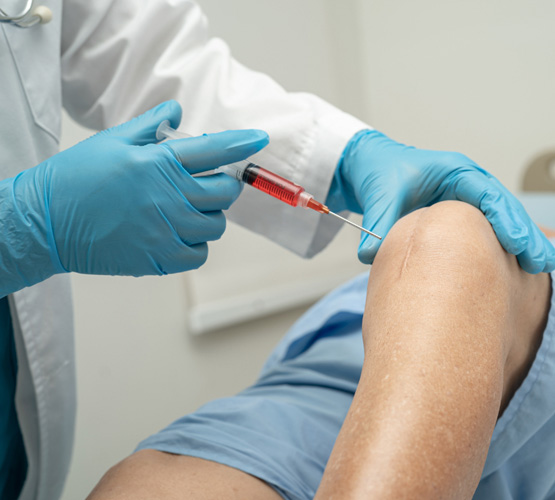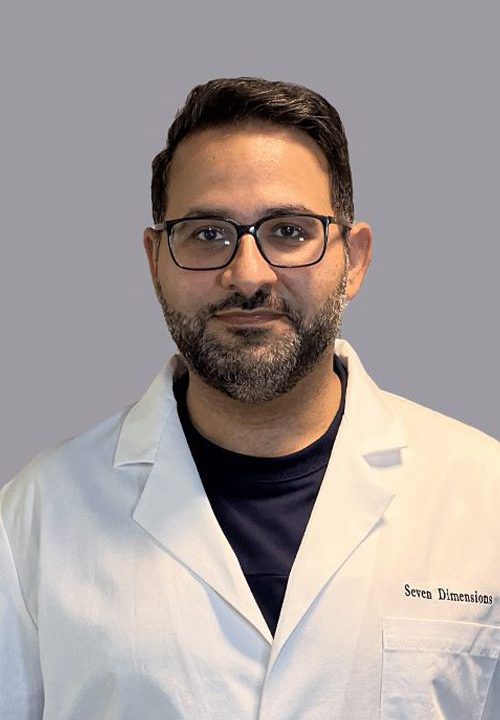Now AED 880 (AED 1500)
PRP is a non-surgical treatment that helps to reduce knee pain, joint pain & inflammation, while also repairing damaged cartilage
Schedule your appointment. No credit card required.
Schedule your appointment. No credit card required.
The treatment works by taking advantage of the bloods natural healing properties to repair damaged cartilage in the knee and reduces pain, inflammation and joint function.
Our specialists take a sample of your blood and spin it in a centrifuge to concentrate it to the optimal level. These platelets are then injected into the injured part of your body to aid in the healing process.
Research has shown that PRP can actually help to regenerate cartilage that's been degraded by osteoarthritis or rheumatoid arthritis.
Depending on your condition, you should see results between 2-6 weeks after receiving a PRP injection. Mild injuries or chronic pain cases typically see results within the first two weeks, while more serious injuries won't be able to appreciate the healing until around a month has passed.
The plasma injected during the therapy lasts anywhere from six and nine months, during which time it will continue to aid in healing the soft-tissue injury.
For knee pain & arthritis, we suggest 2-3 injections about two weeks apart for the best effect of PRP therapy. Generally, 2-3 injections are better than one as they can last 24 months.
PRP is a low-risk procedure and is considered to be one of the safest options for knee & joint pain treatment. Your body won't reject or react negatively to the procedure as PRP utilizes the patient's own blood to treat their joint injuries or pain. It is an effective treatment for pain and injured joints, and is a recommended alternative to costly surgical procedures. By taking PRP injections on time, it is even possible to avoid the need for knee replacement surgery.
Schedule your appointment. No credit card required.
Dr Mohamed Abou Koutah graduated from the University of Cologne, Germany and completed German specialty program (Facharzt) in Orthopedics and Traumatology.
He is certified by the Medical Association of Westphalia-Lippe, Münster – Germany and has completed fellowship for complex orthopedic surgery in joint replacement and arthroscopy at the University Hospital of Bochum.
He is an authorized instructor for the special orthopedic surgery training by the Medical Association of North Rhein- Dusseldorf, Germany and practiced in Germany and UAE for more than 16 years and had Position of head of department at Al Sharq Hospital. his main focus on sports injuries, shoulder , knee and hip arthroscopy including ACL reconstruction with modern and minimally invasive techniques, shoulder labral repair and rotator cuff injuries.
He has also authored medical publications and has been a speaker in international meetings. He is an active member of German Association of Orthopedic Surgery, European Association of Arthroscopy and Joint Surgery and Arthroscopy Association of North America.
Now For Only AED 880
50% OFF on initial consultation with our Orthopedic Doctor if you opt for treatment. Without treatment, a fee of AED 500 is charged as consultation fees.
Schedule your appointment. No credit card required.
PRP injection therapy is a type of non-surgical treatment for knee pain that involves injecting a concentrated solution of platelets, growth factors, and other healing elements from the patient's own blood into the knee joint.
PRP injection therapy works by promoting the body's natural healing process. The concentrated platelets and growth factors in the PRP solution stimulate the growth of new tissue, reduce inflammation, and improve blood flow in the knee joint, which can reduce pain and improve mobility.
Yes, PRP injection therapy is generally safe when performed by a qualified healthcare professional. However, there are some risks and potential side effects that you should be aware of, such as infection, bleeding, and pain at the injection site.
The number of PRP injections needed to achieve pain relief varies depending on the severity and cause of your knee pain. Some people may only need one injection, while others may require a series of injections over several weeks or months.
The time it takes for PRP injection therapy to work can vary depending on the individual's response to treatment. Some people may experience pain relief within a few days, while others may take several weeks to notice a difference.
The effects of PRP injection therapy can last anywhere from several months to a year or more, depending on the individual's response to treatment.
PRP injection therapy is typically used for knee pain caused by osteoarthritis or other types of inflammation in the joint. It may not be effective for other types of knee pain, such as pain caused by a torn ligament or other injury.
PRP injection therapy is typically used for knee pain caused by osteoarthritis or other types of inflammation in the joint. It may not be effective for other types of knee pain, such as pain caused by a torn ligament or other injury.
You may be advised to rest and avoid strenuous activity for a short period of time after receiving PRP injections. However, most people are able to resume their normal activities within a few days.
Yes, PRP injection therapy can be used in combination with other treatments for knee pain, such as physical therapy, exercise, and weight management. Your healthcare provider can help determine the best treatment plan for your individual needs.
If you are experiencing knee pain, you should consult with a qualified healthcare professional to determine the cause of your pain and the most appropriate treatment options for your individual needs. PRP injection therapy may be a good option for some people, but it is not suitable for everyone.
Diamond Business Centre A, 1st Floor, Arjan Near Dubai Miracle Garden
Dubai - United Arab Emirates
+9714243477
Made by Dubai’s #1 Performance Marketing Agency: Gateway Marketing Digital


